Mason Donovan and Mark Kaplan: Diversity Pays
 Mason Donovan and Mark Kaplan are principals of The Dagoba Group, a global diversity and inclusion consultancy focused on delivering measurable returns. They are co-authors of The Inclusion Dividend: Why Investing in Diversity & Inclusion Pays Off (Bibliomotion 2013).
Mason Donovan and Mark Kaplan are principals of The Dagoba Group, a global diversity and inclusion consultancy focused on delivering measurable returns. They are co-authors of The Inclusion Dividend: Why Investing in Diversity & Inclusion Pays Off (Bibliomotion 2013).
Women For Hire asked them five questions.
1) In your book you argue that diversity and inclusion have evolved from “the right thing to do,” to being a smart business move. Why?
With over two decades of working with corporations around the world, we have found that creating a diverse and inclusive corporate culture pays off at the individual level with happier, more fulfilled employees, at the group level with increased productivity and innovation and at the systemic level with additional bottom line shareholder value.
D&I has benefited in the last ten years from a plethora of thorough research ranging from academic institutions to private businesses. Several studies clearly link higher innovation with diversity.
McKinsey’s 2012 study showed that companies who focus on decreasing bias outperform those who don’t by a full 7 percent. A Merrill Lynch study showed those who were top ranked by Working Mother Magazine outperformed the S&P. The highest valued company in the world, Apple, has hinged its success on their D&I approach with suppliers, marketing and people. D&I has and will continue to prove to be a market differentiator.
2) On a scale of 1 to 10, where is American business today in terms of welcoming women as equal partners in all ways?
In order to answer this question, we need to separate the dialogue (above a 5) from today’s reality (below a 5). First off, the dialogue has reached a national level both in the public and corporate domain. It was a major talking point during the last election.
Those who were proactively vocal about the equality of women in pay and opportunity, won. Candidates who were perceived as wanting to limit women in any way were put to the task. As a diversity and inclusion consultancy based in New Hampshire, we are very proud to be the first state in the Union to have full female representation. Our Governor, US Reps and Senators, as well as our Chief Justice, are all women.
In an interview series with F1000 Chief Diversity Officers, CDOs said gender was the number one area of focus globally. Women have more employee resource groups, devoted programs and strategy than any other dimension of difference in the workplace. Having a great dialogue is not enough though. We are still way behind on the results.
Although women account for more than half those graduating with degrees and are typically more than half a corporate workforce, a very noticeable pay and executive presence gap still exists. Women only hold 4.5 percent of CEO positions in the Fortune 1000. In study after study, women have yet to even reach a 20 percent presence in executive positions. There is a lot of work yet to do to translate the dialogue into results.
3) What causes most women to leave their employers?
Women, like men, leave employers for many of the same reasons; compensation, working environment and opportunity. What should be studied more closely is the greater degree women leave for one aspect as compared to men.
A Catalyst study found the two main push drivers for women to leave are advancement opportunities and attention. Given the lack of presence of women today in executive positions, this study is not surprising. The most widely held perception for women leaving is work-life balance. Interestingly enough, we have seen private data research which has shown men to value work-life balance greater than women.
4) What’s the single biggest ongoing career mistake that women make in corporate culture?
The biggest mistake for any corporate outsider group is failure to network. Networking is paramount to climbing the corporate ladder. Although we wish we lived in a true meritocracy, the reality today is the reward system is very much influenced by affinity.
The greater anyone can connect to a wider audience, the more opportunities will be presented. Yes, you do need to excel in what you do, but you also need to have the connections to have your efforts recognized by the decision makers.
5) What can any woman do now to make sure that management gives them an equal shake?
As noted in the previous question, an individual needs to first perform and then have that performance recognized. On another point, the dialogue around gender equality cannot be monopolized by women. It is vitally important for men to champion these issues. A strategic approach which purposefully reaches out to men to be champions of gender equality will help propel the dialogue into actual results.
Women employee resource groups should have men on their executive board. Mentoring programs should include gender as a criteria point for matching women with men. Lastly, women need to be specific with exit interviews on the real reasons why they are leaving their employer. All too often it is easier not to mention the gender issues. The more companies realize gender inequality is causing them to lose quality employees, the more likely they are to take corrective measures.

Submit a Comment